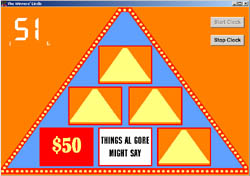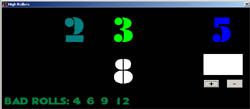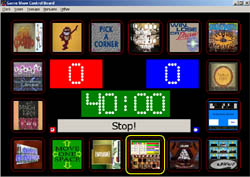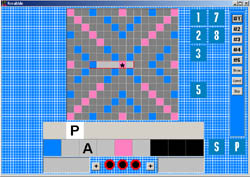What is Mike's Game Show Round?
I hosted my first College Bowl-style tournament at the University of Michigan in April 1997. Unlike the TV show you may have remembered, this tournament got rid of all of those pesky Literature, Geography, Science and History questions nobody can answer and instead used questions exclusively in the areas of music, movies, TV, sports and popular culture. Part of the fun of hosting a tournament is developing your own finals packet. For one of the questions, inspired by onetime teammate Rob Long, I wrote a bonus question where your score would be based on your ability to do a game show. The game in question was Hole in One from The Price is Right. The crowd loved it.
That went over well, so in the next year I spent a month building (albeit very poorly) an honest to God pyramid complete with functioning trilons. It cost me $110 to build, and it was in use for 60 seconds (Ernie Kovacs would be proud). The team that got the bonus failed to complete the Pyramid, missing the $250 clue "Sports Played Without a Ball". Again, the crowd loved it.
Well, what to do for the third year? Again, the finals game featured a bonus game from The Price is Right -- Race Game. However, the treat was to come later in the day once the tournament was over.
 Part of the fun of popular culture-style tournaments is the post-game exhibition theme rounds. Over the years, there's been countless Simpsons rounds, Star Trek rounds, baseball rounds and the like, but how about one on game shows. So, in late 1998, I sat down and wrote the skeleton of the first game show round, which featured 8 tossup questions, 4 tossup game show recreations, 4 bonus questions and 8 bonus game show recreations.
Part of the fun of popular culture-style tournaments is the post-game exhibition theme rounds. Over the years, there's been countless Simpsons rounds, Star Trek rounds, baseball rounds and the like, but how about one on game shows. So, in late 1998, I sat down and wrote the skeleton of the first game show round, which featured 8 tossup questions, 4 tossup game show recreations, 4 bonus questions and 8 bonus game show recreations.
 When I started to write the actual thing, I noticed that the normal-style questions were either going to be very hard for the non-game show geek, or super easy for the game-show geek. Since "the game is the thing", I quickly dropped the questions and started on programming the games using Visual Basic 4. The format would be like a College Bowl game, with tossup games leading into bonus games. There were four games that filled both bills as a tossup and a bonus -- Pyramid, Family Feud, Concentration and Password. Four games served as just tossups -- High Rollers, Match Game, Card Sharks and I've Got a Secret. To finish out the round, these games served as bonuses -- Cliffhanger (from The Price is Right), The Joker's Wild, Tic Tac Dough and Win Ben Stein's Money. Included was a chance at an "Instant Bargain", where points could be used to purchase a bag of Doritos. Each game was played in succession and it took about 50 minutes. Much fun was had by all.
When I started to write the actual thing, I noticed that the normal-style questions were either going to be very hard for the non-game show geek, or super easy for the game-show geek. Since "the game is the thing", I quickly dropped the questions and started on programming the games using Visual Basic 4. The format would be like a College Bowl game, with tossup games leading into bonus games. There were four games that filled both bills as a tossup and a bonus -- Pyramid, Family Feud, Concentration and Password. Four games served as just tossups -- High Rollers, Match Game, Card Sharks and I've Got a Secret. To finish out the round, these games served as bonuses -- Cliffhanger (from The Price is Right), The Joker's Wild, Tic Tac Dough and Win Ben Stein's Money. Included was a chance at an "Instant Bargain", where points could be used to purchase a bag of Doritos. Each game was played in succession and it took about 50 minutes. Much fun was had by all.
Over 1999, I rewrote the program from being in Visual Basic to being in Borland's Delphi, partially to take advantage of its greater multimedia capacity over Visual Basic, and partially because my job required me to learn Delphi, so it was beneficial for me to learn it. For the 2000 version, I moved High Rollers to being a bonus game, added Who Wants to Be a Millionaire and Any Number as bonus games while adding Blockbusters and Win, Lose and Draw as tossup games, dropping Win Ben Stein's Money and I've Got a Secret.
 During 2000, I received requests for more games and it was becoming a challenge to decide what to drop. It already took an hour to play through the whole thing, so I really couldn't add more time. Then, inspiration hit me. Why not randomly select what games would be played over a time period? Simple enough, game shows love randomness. But what board to use? Let's Make a Deal-style, Blankety Blanks-style, Gambit-style. I finally decided on Press Your Luck. So, in came a clock and many more games, including Hot Potato, Scrabble, Smush, Range Game, Chain Reaction and others. Even a Whammy, which caused you to lose all your points, was added.
During 2000, I received requests for more games and it was becoming a challenge to decide what to drop. It already took an hour to play through the whole thing, so I really couldn't add more time. Then, inspiration hit me. Why not randomly select what games would be played over a time period? Simple enough, game shows love randomness. But what board to use? Let's Make a Deal-style, Blankety Blanks-style, Gambit-style. I finally decided on Press Your Luck. So, in came a clock and many more games, including Hot Potato, Scrabble, Smush, Range Game, Chain Reaction and others. Even a Whammy, which caused you to lose all your points, was added.
 In addition, there are some games unfamiliar to American viewers -- Defintion from Canada and Countdown from England. Additionally, I have written two games: Rank and File (since retired) and The Phone Game. Common Knowledge came over from the Saturday Night Live skit, We've Got Your Number was retooled from the failed 1975 Jack Barry pilot, while Hollywood Squares and Whew! were adapted to be part of the world of The Simpsons.
In addition, there are some games unfamiliar to American viewers -- Defintion from Canada and Countdown from England. Additionally, I have written two games: Rank and File (since retired) and The Phone Game. Common Knowledge came over from the Saturday Night Live skit, We've Got Your Number was retooled from the failed 1975 Jack Barry pilot, while Hollywood Squares and Whew! were adapted to be part of the world of The Simpsons.
Now the Game Show Round essentially hits the quiz bowl travel circuit, making appearances in such places as Chattanooga, Cleveland, Washington DC and most recently Las Vegas, where the game was tried out by some game show luminaries including Bob Boden, Jason Bloch and Steve Beverly.
Will I ever release this to the public. I doubt it. Here are my reasons:
- I'm a software publisher in real-life. I know what it takes to make a true quality program. I don't have the time nor the resources to get this properly bullet-proofed, documented and maintained. If I want to stop working on it one day, I'll stop, and I don't have to worry about the repercussions.
- Although a handful of games can be played without game material, most of these games require questions. I only keep enough in the hopper to have a couple of fresh games ready. So, for games like Pyramid which have been around the most, I only have 19 rounds available. And for newer games, such as Smush, I only have three. You'll be bored of this quickly.
- Also, these games were designed with the concept of the player not controlling the game board. For example, for Family Feud, the only way to find out the answers is to look on the answer sheet and select the proper indicator to flip. You really can't play this alone.
- Except for the one game that is entirely my creation or the three that I derived from forgotten games/Saturday Night Live skits, I don't have the rights to publish these. The less lawyers in my life, the better.
Special thanks go to two invaluable contributors -- 2001 Millionaire champion Kevin Olmstead and 1996 Jeopardy! champion Craig Barker. I can do whatever I need to do and they're there, whether it's Kevin providing multimedia assistance or Craig picking out that choice question set that will challenge the players. Dozens of people requested this game or that game, and I've tried my best to accomodate requests. Also, graphics/sounds have been repurposed from several websites, especially Jay Lewis' Game Show Sound Effects Archive.
So you want to play this? If you live in or plan on being in the Ann Arbor, Michigan area, give me a holler. I'll be happy to show it to you. Normally, it has four steady playings, twice in Ann Arbor (once in January and once in August), wherever TRASH nationals is held and a playing in Chattanooga in December.
What's in The Game Show Round?
| Classic Tossup and Bonus |
    |
| Classic Pairings |
     
     |
| International Games |
  |
| Mike Burger Originals |
    |
| Other Board Pieces |
    |
Page last updated: 8-August-2003 | E-mail the author.
 Part of the fun of popular culture-style tournaments is the post-game exhibition theme rounds. Over the years, there's been countless Simpsons rounds, Star Trek rounds, baseball rounds and the like, but how about one on game shows. So, in late 1998, I sat down and wrote the skeleton of the first game show round, which featured 8 tossup questions, 4 tossup game show recreations, 4 bonus questions and 8 bonus game show recreations.
Part of the fun of popular culture-style tournaments is the post-game exhibition theme rounds. Over the years, there's been countless Simpsons rounds, Star Trek rounds, baseball rounds and the like, but how about one on game shows. So, in late 1998, I sat down and wrote the skeleton of the first game show round, which featured 8 tossup questions, 4 tossup game show recreations, 4 bonus questions and 8 bonus game show recreations. When I started to write the actual thing, I noticed that the normal-style questions were either going to be very hard for the non-game show geek, or super easy for the game-show geek. Since "the game is the thing", I quickly dropped the questions and started on programming the games using Visual Basic 4. The format would be like a College Bowl game, with tossup games leading into bonus games. There were four games that filled both bills as a tossup and a bonus -- Pyramid, Family Feud, Concentration and Password. Four games served as just tossups -- High Rollers, Match Game, Card Sharks and I've Got a Secret. To finish out the round, these games served as bonuses -- Cliffhanger (from The Price is Right), The Joker's Wild, Tic Tac Dough and Win Ben Stein's Money. Included was a chance at an "Instant Bargain", where points could be used to purchase a bag of Doritos. Each game was played in succession and it took about 50 minutes. Much fun was had by all.
When I started to write the actual thing, I noticed that the normal-style questions were either going to be very hard for the non-game show geek, or super easy for the game-show geek. Since "the game is the thing", I quickly dropped the questions and started on programming the games using Visual Basic 4. The format would be like a College Bowl game, with tossup games leading into bonus games. There were four games that filled both bills as a tossup and a bonus -- Pyramid, Family Feud, Concentration and Password. Four games served as just tossups -- High Rollers, Match Game, Card Sharks and I've Got a Secret. To finish out the round, these games served as bonuses -- Cliffhanger (from The Price is Right), The Joker's Wild, Tic Tac Dough and Win Ben Stein's Money. Included was a chance at an "Instant Bargain", where points could be used to purchase a bag of Doritos. Each game was played in succession and it took about 50 minutes. Much fun was had by all. During 2000, I received requests for more games and it was becoming a challenge to decide what to drop. It already took an hour to play through the whole thing, so I really couldn't add more time. Then, inspiration hit me. Why not randomly select what games would be played over a time period? Simple enough, game shows love randomness. But what board to use? Let's Make a Deal-style, Blankety Blanks-style, Gambit-style. I finally decided on Press Your Luck. So, in came a clock and many more games, including Hot Potato, Scrabble, Smush, Range Game, Chain Reaction and others. Even a Whammy, which caused you to lose all your points, was added.
During 2000, I received requests for more games and it was becoming a challenge to decide what to drop. It already took an hour to play through the whole thing, so I really couldn't add more time. Then, inspiration hit me. Why not randomly select what games would be played over a time period? Simple enough, game shows love randomness. But what board to use? Let's Make a Deal-style, Blankety Blanks-style, Gambit-style. I finally decided on Press Your Luck. So, in came a clock and many more games, including Hot Potato, Scrabble, Smush, Range Game, Chain Reaction and others. Even a Whammy, which caused you to lose all your points, was added. In addition, there are some games unfamiliar to American viewers -- Defintion from Canada and Countdown from England. Additionally, I have written two games: Rank and File (since retired) and The Phone Game. Common Knowledge came over from the Saturday Night Live skit, We've Got Your Number was retooled from the failed 1975 Jack Barry pilot, while Hollywood Squares and Whew! were adapted to be part of the world of The Simpsons.
In addition, there are some games unfamiliar to American viewers -- Defintion from Canada and Countdown from England. Additionally, I have written two games: Rank and File (since retired) and The Phone Game. Common Knowledge came over from the Saturday Night Live skit, We've Got Your Number was retooled from the failed 1975 Jack Barry pilot, while Hollywood Squares and Whew! were adapted to be part of the world of The Simpsons.
























